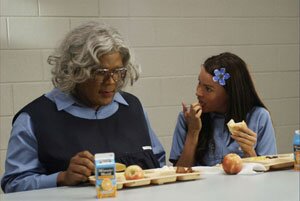MOVIE REVIEW- Big box: Not-so-funny Madea packs 'em in.
 PUBLICITY PHOTO
PUBLICITY PHOTO
"Do you have to be in control of everything all the time?" Dr. Phil (playing himself) asks Madea (Tyler Perry) during anger management counseling in Tyler Perry's Madea Goes to Jail.
One might ask the same of Perry. He also wrote, directed, produced (with Reuben Cannon) and plays two other roles in what's being misleadingly sold as a comedy.
Surely there exist cave paintings of men in dresses that kept our prehistoric ancestors in stitches. All Tyler Perry– or Eddie Murphy, Robin Williams, Martin Lawrence or Dustin Hoffman, among others– has to do is get in drag and modern audiences crack up. If the actors have funny things to say and do the laughter continues.
Perry gives himself-as-Madea some gut-bustingly funny things to say and do, but they're parceled out sparingly in a movie that's about 90 percent drama and 10 percent comedy. Madea's story is a subplot that doesn't really link up to the main story until Madea, as the title reveals, goes to jail. That occurs more than two-thirds of the way in– three-quarters if you don't count the closing credits, which keep viewers in their seats with an alternate take of the Dr. Phil scene.
Mabel Simmons' (a.k.a. Madea) sordid past, including being a problem child, working as a stripper and attacking a wrestler, is reviewed in an opening montage. She's in trouble again, but a loophole lets her avoid prison for the moment.
In the district attorney's office we meet Joshua (Derek Luke) and Linda (Ion Overman), who are engaged, and Josh's best friend, Chuck (RonReaco Lee). Linda, with an 89 percent conviction record, is assigned to prosecute Madea.
In court the same day is Candace (Keshia Knight Pulliam), a young prostitute and heroin addict. Josh recuses himself from the case when he realizes he knows her. Actually they have quite a history, from childhood through two years of college. Their full story emerges later, after Josh's attempts to help Candy and get her off the streets jeopardize his relationship with Linda, "entirely too much of a princess," who had a bourgeois upbringing while Josh and Candy came up from the hood.
Linda's overzealousness in prosecuting Candy calls Chuck's attention to her unethical methods. Josh doesn't notice until after Candy's been in prison over six months and, absurdly, he brings her files to read in the church on his wedding day.
Aiming his films at religious viewers with a sense of humor, Perry always includes some sermonizing. Viola Davis appears as Ellen, a minister who, having once worked the streets herself, tries to help prostitutes, whether they need legitimate jobs or clean needles. She also lectures in prison, where she and Madea do a tag-team sermon on forgiveness.
Since this is a movie, forgiveness ultimately goes out the window in favor of a cathartic downfall for the villain of the piece.
The movie gets a little self-referential in mocking its gender-bending aspects, from Tom Jones singing "She's a Lady" behind the opening credits to a cop saying of Madea, "That woman got the strength of any man," to her brother Joe (also Perry) saying, "Madea got a prostate." Madea taunts the prison bully, Big Sal (Robin Coleman), a butch blonde with a masculine voice, calling her "sir" and "young man."
Like many who have started at the bottom and achieved fabulous success, Perry doesn't know his limitations and probably surrounds himself with sycophants who won't tell him. He doesn't let critics review his films in advance because he doesn't want to hear any negativity, even if it could improve his product in the long run– and probably because most of us are Caucasian and thus not genetically predisposed to "get" him.
Before he started directing and spreading himself too thin, Perry wrote and starred in Diary of a Mad Black Woman, of which I was a fan. In the Obama era, there's no reason Madea can't reach a crossover audience. She's a fabulous creation, but putting her in sloppily written, poorly directed films does her a disservice, besides being disrespectful both to shunned critics and to those audiences, which were dwindling steadily before this movie had a record opening last weekend, who will buy anything with the Tyler Perry brand on it.
Using Madea as comic relief is like a pastor opening a sermon with a joke to loosen up the congregation and make them receptive to the message that follows; but it doesn't make a movie a comedy. Viewers lured to Tyler Perry's Madea Goes to Jail under false pretenses may well end up echoing Madea's own words: "Lor', do I have to listen to all this melodrama?"
#